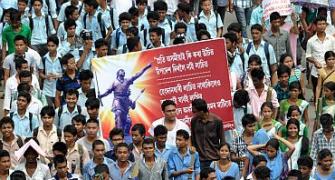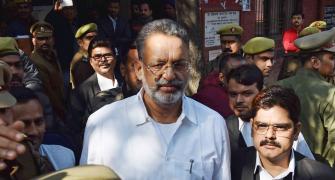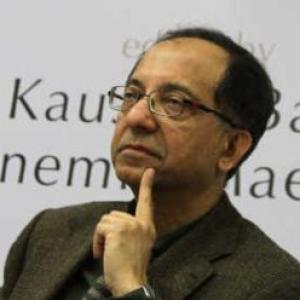Cyberspace is proving to be a facilitator for malevolents seeking to enlist new recruits and to purvey a distorted version of the reality...
Take prompt notice of every piece of intelligence as it is received, develop capacities for addressing the threats posed by terrorism, share experiences and create an overall milieu of collaboration wherein there should be no distinction between central agencies and state police forces...
Recent months saw an increase in communal incidents in the country, specially in the states of Uttar Pradesh, Madhya Pradesh and Maharashtra as compared with the same period last year...
Home Minister Sushil Shinde made these observations while inaugurating the annual conference of DGPs/IGPs on September 6 in New Delhi. His speech is reproduced below
My distinguished colleagues in the Ministry, Shri Mullapally Ramachandran and Shri Jitendra Singh, Shri Shivshankar Menon, Shri Ajit Seth, Shri R.K. Singh, Shri Sandhu, Directors General and Inspectors General of Police of the States and the Union Territories, Chiefs of Central Police Organisations, other delegates, members of the media, ladies and gentlemen.
I pay my tribute to the men and women of the Police Forces who have bravely confronted many challenges to the Internal Security of our great nation and many of these personnel have made the supreme sacrifice. I join my countrymen in saluting their contribution.
On this occasion Police Medals have been awarded for Meritorious Service to officers of the Intelligence Bureau. I did so with great pleasure and offer my warm congratulations and good wishes to those who have received this honour today.
In the short period of 6 weeks that I have handled the responsibility of Union Home Minister, I have personally experienced aspects of the major threats to national security. The serial bomb blasts in Pune on August 1st which though resulted in a single injury, thus being less then intended number of casualties, is no cause for comfort. The incident reflects the potential of terrorist groups, their ability to move swiftly across jurisdictional boundaries, maintain communication at the subliminal level, access hardware, and carry out terrorist actions with telling effect.
There is increasing evidence of resort taken by terrorists to the cyber-space domain. The recent incidents in Bengaluru in Karnataka, Pune in Maharashtra and other states of India where motivated rumours and irresponsible use of the social networking media posed a new challenge.
Besides providing a pervasive infrastructure for discreet communication, cyberspace is proving to be a facilitator for malevolents seeking to enlist new recruits and to purvey a distorted version of the reality.
Anonymity that the user acquires in this medium can sometimes test the capacities of even the most experienced Police investigator. Police forces will have to develop skills in this area not just for locating malicious content but also for identifying those responsible for posting it.
We remain aware of the threat that various terrorist outfits still continue to pose, and we are cognisant of the continuous thrust of Pak-based Islamist groups to infiltrate terrorists and hardware across the International Border and Line of Control and elevate the level of terrorist violence in different parts of India.
I would urge you to take prompt notice of every piece of intelligence as it is received, develop capacities for addressing the threats posed by terrorism, share experiences and create an overall milieu of collaboration wherein there should be no distinction between Central agencies and State Police Forces as they work together towards achieving the common objective of curbing terrorism. I draw comfort from the fact that, since January 2011, your collaborative efforts have resulted in the interdiction of 19 terrorist modules. Many of those involved have been exposed and will face trials.
Yet, there remain some cases like the serial blasts in Mumbai in mid-July 2011 and the blasts outside Delhi High Court in September 2011, wherein many perpetrators have so far managed to evade arrest. I would, therefore, call upon you to redouble your efforts for locating and apprehending such absconders so that the terrorist thrust can be blunted. It is my strong belief that every element of the security apparatus will strive hard for achieving these objectives we have in mind.
I thought I might take this opportunity to state that threat related intelligence should be carefully handled, and that should be worked upon diligently but discreetly. Premature exposure of such intelligence can retard and even defeat the possibility of interdiction. Similarly, revealing of clues as collected by painstaking investigations to the print & electronic media alerts other conspirators and blunts the momentum of investigations. Lastly, effectiveness of novel techniques evolved by investigators is also quickly eroded by the indiscriminate disclosure of specifics in the public domain. Investigations must remain firmly focused on identifying precisely the perpetrators.
Naxalism continues to pose a significant challenge. Seven states are experiencing different levels of intensity of this problem. However, nearly 80% of Naxal violence is taking place in less than 30 Districts and many of these are close to the inter-State boundaries. There are indicators about increase in the number of trained and armed cadres, reorganisation of military potential for formation of new battalions, and the creation of well-developed indigenous capacity for accretions to their arsenal. Confidence levels of the Maoists are exhibited in their ability to move in larger formations, hold Jan Adalats, obstruct thoroughfares, and recover levies. Jan Militia cadres are increasingly integrated into the armed forays of Naxal groups. On its part, the Union Government is 5 committed to providing every support required by the State Police Forces, and that is being done in a liberal way.
The approach of Central Government is to deal with Left Wing Extremism in a holistic manner, in the areas of security, development, good governance and public perception management. The Central Government is committed to deal firmly with Left Wing Extremism groups indulging in crime and violence.
The overall objective being to uphold the law of the land, provide security of life and property and provide a secure environment for development and economic growth.
With respect to security related interventions, the Government of India provides financial assistance to States under various schemes like the Security Related Expenditure (SRE) Scheme, Special Infrastructure Scheme (SIS), the Fortified Police Station Scheme, etc.
In addition, the Government of India has also deployed 81 Battalions of Central Armed Forces (CAPFs)to assist the State Governments.
In the development related interventions, the Government of India is implementing the Integrated Action Plan (IAP) in 82 districts of India. This is a specific scheme to address Left Wing Extremism problem with focus on creating public infrastructure and services. The implementation of this scheme at the State level has been extremely encouraging in most of the 6 Left Wing Extremism affected States. Also, an ambitious Road Requirement Plan-I to develop a total road length of 5477 kilometres in 34 most Left Wing Extremism affected districts is under progress. This scheme is being implemented at a total cost of Rs 7300 crores. The Planning Commission also has a mechanism to monitor implementation of flagship schemes in Integrated Action Plan districts.
The Left Wing Extremism affected States need to improve the police-population ratio, strengthen the intelligence set-up, raise Special Forces to deal with Left Wing Extremism and enhance the state police budget by making adequate provisions for equipment, weaponry, mobility, communication, training, police station buildings including housing and forensic science.
You need to design operational strategies for optimal use of all resources. Central Armed Police Forces, particularly the CRPF, have developed tactics to deal with the threat posed by Naxals, particularly those that intend to operate close to inter-State boundaries. I would appeal to you to make use of this potential. The States should also give priority to effective implementation of developmental schemes leading to all-round development of Left Wing Extremism affected areas, for a permanent solution to this problem.
The security situation, by and large, in the North Eastern States has been improving because of the multi-pronged strategy adopted by the Central Government towards the demands of the insurgent groups operating in the region. The insurgent groups are gradually realizing that the Central Government is serious about elevating the socio-economic status of the ethnic groups in the North Eastern States and providing funds through DONER and other infrastructural Ministries in the Central Government for the overall improvement of the North East in infrastructure, communication and connectivity.
Such confidence building measures over the years have induced more and more ethnic groups to come forward to shed violent means and to find solution to their problems through negotiations.
The Government is also strengthening the dispute resolution mechanism in the region.
Notifications for setting of High Courts in Manipur, Meghalaya and Tripura have been issued. More focussed administrative efficiency is also likely to be put in place by North Eastern Areas Reorganization (Amendment) Bill, 2011 to enable separation of All India Services Cadre of Manipur and Tripura.
However, it is unfortunate that the recent violence caused by the ethnic Groups in Assam has been given communal colour and has resulted in heavy loss of lives and displacement of people to relief camps. I am happy to note that normalcy is restoring to Assam gradually and people are going back from relief camps to their native places due to security arrangements made by the State Police in vulnerable areas. I would request the State Governments to take all possible measures to prevent recurrence of such incidents in future.
Recent months saw an increase in communal incidents in the country, specially in the states of Uttar Pradesh, Madhya Pradesh and Maharashtra as compared with the same period last year. However, the communal situation in the country by and large withstood the attempts made to provoke communities by various fundamentalist groups/organisations.
It is a tribute to the maturity of our citizens and even handling of such challenges by our State Police Forces.
Moving to Jammu and Kashmir, I have the pleasure to register my satisfaction with regard to the success of efforts made by all elements of the J&K Government in ensuring steady progress towards controlling terrorist violence and buttressing the confidence of the people about the bright future of their province. Excellent arrangements led to a successful Amarnath Yatra this year and the number of tourists to J&K has increased significantly, with more than 9.1 lakh tourists having visited that State so 9 far this year as against about 5 lakh last year. We realise that there are still sections of society in J&K, albeit small ones with limited influence, which have grievances. Such groups should realise that spirit of accommodation can create the backdrop for democratic aspirations of the people to be achieved.
With the range of security challenges that this country confronts, several mechanisms are in place and others are under implementation. The Union Government remains duty bound to assist the State Police Forces such that their capacity can be enhanced. But each of you have a responsibility to ensure that funds provided are properly used, vacancies at your own end are filled up and special capacities are created for dealing with threats to peace and security posed by terrorism and
naxalism. The reach of the Multi-Agency Centre is proposed to be increased and efforts are afoot, with your cooperation, for implementation of the Crime and Criminal Tracking Network System (CCTNS). With regard to CCTNS, over Rs. 298 Crores out of the Rs. 421 crores released to States/UTs are lying unspent. This money needs to be spent expeditiously as per MHA guidelines to enable further releases. I would request your personal involvement and interest in this key initiative.
Serious crimes against women have continuously increased during the period 2009-11. We need to adopt appropriate measures for swift and salutary punishment to the persons found guilty of violence against women.
The overall representation of women in police forces should be increased through affirmative action as there are only 83,829 women police in our country as on 01.01.2012.
In 2011 alone, nearly 60,000 children are reported to be missing in the country. This is such a large number that it merits some attention from the police at all levels.
The NIC has developed 'Track the Missing Children Portal' which has been successfully piloted in the state of West Bengal for the last three years and would be available to all police stations in the country as well as all the child care institutions. This would enable faster detection of matches of lost and found children which will enable recovery.
The Central Government remains fully committed to support the upgradation and modernization of the State Police Forces. Government of India has disbursed a total amount of more than Rs 12,000 crores during the last 10 years to the States in the form of grants-in-aid under the 11 Modernization of Police Force (MPF) Scheme. The Scheme has made perceptible impact in all the States and has provided much needed assistance and impetus to police modernization. This Scheme is being considered for extension for next five years.
I am happy to inform you that as recommended in the earlier DGPs/IGPs Conference, I have constituted a 9 Member Standing Committee of DGPs headed by DIB to suggest Best Practices and Standard Operating Procedures for any aspect of Police operations/functioning and also propose/recommend assessments on any contemporary issue of national security.
The Police reforms process needs to be pursued by the state governments. So far 14 States, namely Assam, Bihar, Chhattisgarh, Gujarat, Haryana, Himachal Pradesh, Kerala, Meghalaya, Mizoram, Punjab, Rajasthan, Sikkim, Tripura and Uttarakhand have enacted new Police Act or have amended their existing Police Acts. The remaining states need to enact the new Police Act.
In conclusion, let me take this opportunity to assure you that you will have my fullest support in all your well-crafted endeavours to ensure that peace, harmony and order are maintained and that all sections of society 12 are able to enjoy the fruits of development in an uninhibited way.
Consistent efforts must be made to upgrade Police performance such that the full faith and confidence of the people is gained. The people of this country need to be assured that continuous efforts will be made to ensure their safety and security and Police will work as their friend to extend helping hand in any kind of situation. My Ministry is open to every suggestion you might give towards converting the Police into a sympathetic yet effective instrument for the maintenance of public order.
I have great pleasure in inaugurating this Conference of Directors General and Inspectors General of Police. I am confident that all subjects in the agenda will be dealt with exhaustively and fruitful recommendations will flow out of your discussions.
Jai Hind.







